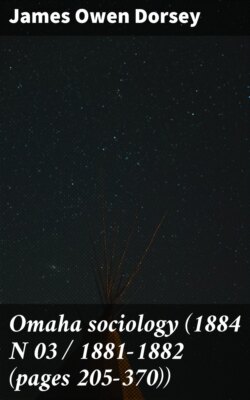Читать книгу Omaha sociology (1884 N 03 / 1881-1882 (pages 205-370)) - James Owen Dorsey - Страница 27
На сайте Литреса книга снята с продажи.
THE WAJINGA ¢ATAJĬ SUBGENS.
Оглавление§ 46. This name means, "They who do not eat (small) birds." They can eat wild turkeys, all birds of the minxa or goose genus, including ducks and cranes. When sick, they are allowed to eat prairie chickens. When members of this subgens go on the warpath, the only sacred things which they have are the g¢edan (hawk) and nickucku (martin). (See § 196.)
Style of wearing the hair.—They leave a little hair in front, over the forehead, for a bill, and some at the back of the head, for the bird's tail, with much over each ear, for the wings. La Flèche and Two Crows do not deny this; but they know nothing about it.
Curious custom during harvest.—These Wajiñga-¢atajĭ call themselves "The Blackbird people." In harvest time, when the birds used to eat the corn, the men of this subgens proceeded thus: They took some corn, which they chewed and spit around over the field. They thought that such a procedure would deter the birds from making further inroads upon the crops.
Wackan-man¢in of this subgens keeps one of the great wa¢ixabe, or sacred bags, used when a warrior's word is doubted. (See § 196.)
§ 47. Sections and subsections of the subgens.—Waniʇa-waqě of the [T]a-da gens told me that the following were the divisions of the Wajiñga-¢atajĭ but La Flèche and Two Crows deny it. It may be that these minor divisions no longer exist, or that they were not known to the two men.
I.—Hawk people, under Standing Hawk.
II.—Mañg¢iqta, or Blackbird people, under Wajina-gahige. Subsections: (a) White heads. (b) Red heads. (c) Yellow heads. (d) Red wings.
III.—Mañg¢iqta-qude, Gray Blackbird (the common starling), or Thunder people, under Wa¢idaxe. Subsections: (a) Gray Blackbirds. (b) Meadow larks. (c) Prairie-chickens; and, judging from the analogy of the Ponka Hisada, (d) Martins.
IV.—Three subsections of the Owl and Magpie people are (a) Great Owls. (b) Small Owls. (c) Magpies.
§ 48. Birth-names of boys.—The first son was called, Mañg¢iqta, Blackbird. The second, Red feathers on the base of the wings. The third, White-eyed Blackbird. The fourth, Dried Wing. The fifth, Hawk (denied by La Flèche). The sixth, Gray Hawk. The seventh, White Wings. This last is a Ponka name, according to La Flèche and Two Crows.
Wajiñga-¢atajĭ men.—Red Wings. Chief who Watches over (any thing). Becomes Suddenly Motionless. Poor man. Standing Hawk. He from whom they flee. Rustling Horns. Scabby Horns. The one Moving towards the Dew (?). White or Jack Rabbit. Gray Blackbird. White Blackbird. Four Hands (or Paws). Ni-¢actage. Yellow Head (of a blackbird). Fire Chief. Coyote's Foot. Buffalo bull Talks like a chief. Bad temper of a Buffalo bull. White Buffalo in the distance. Hominy (a name of ridicule). He who continues Trying (commonly translated, "Hard Walker"). He who makes the crackling sound "Gh+!" in thundering. Bird Chief.
Wajiñga-¢atajĭ women.—(Female eagle) Is Moving On high. Moon in motion during the Day. Turning Moon Female. Mindacan-¢in. Mintena. Visible one that Has returned, and is in a Horizontal attitude.
